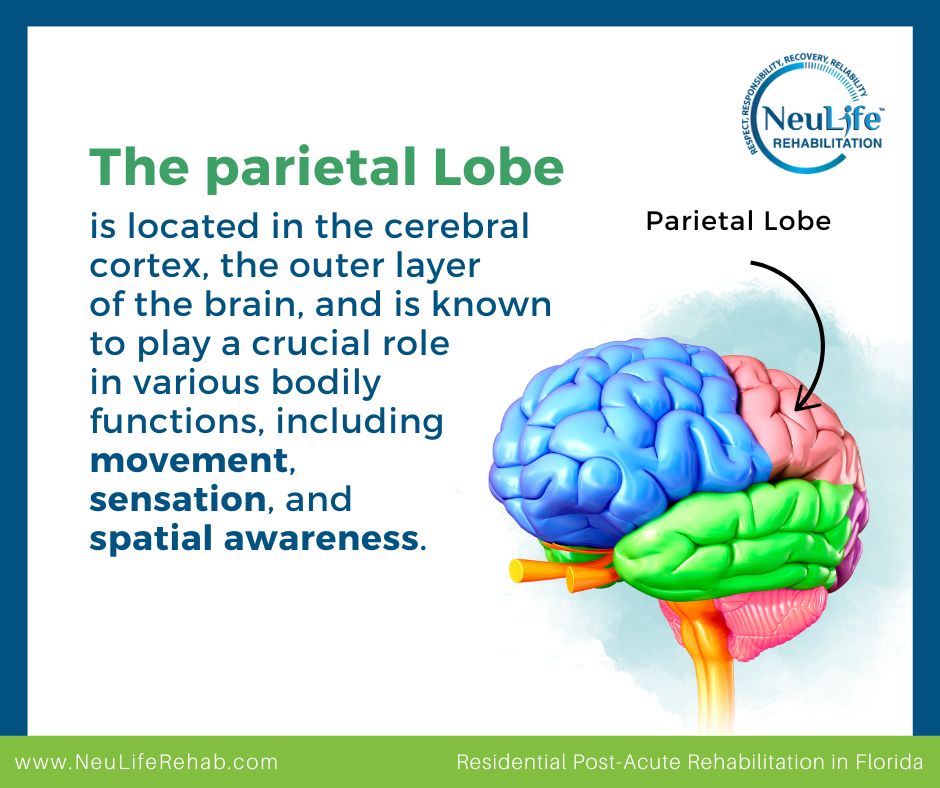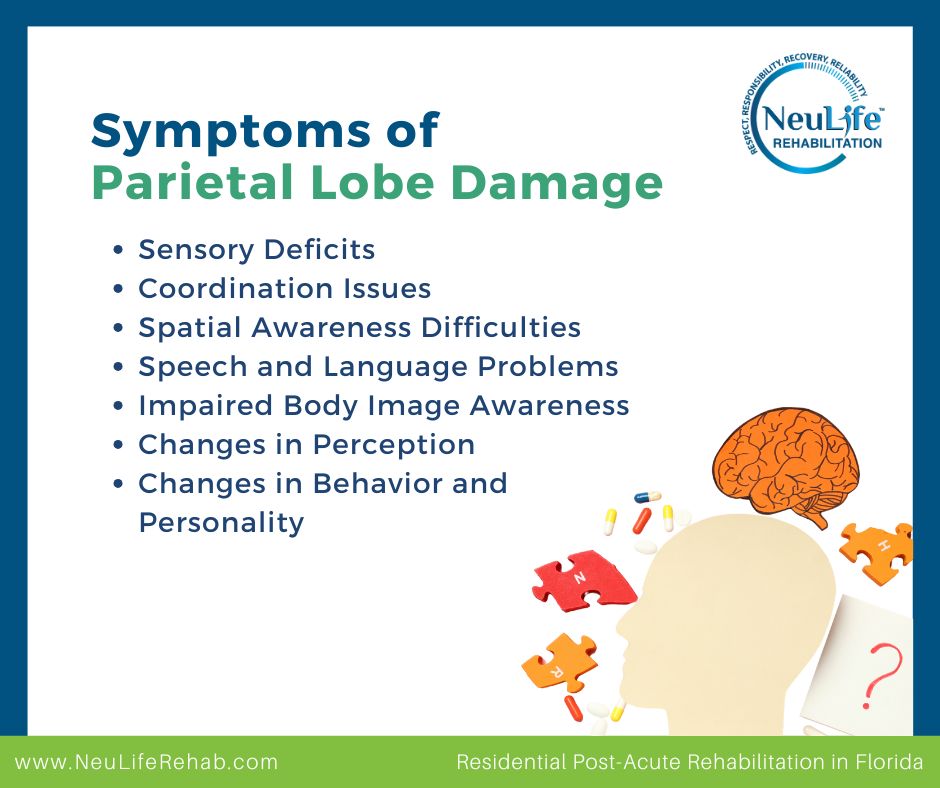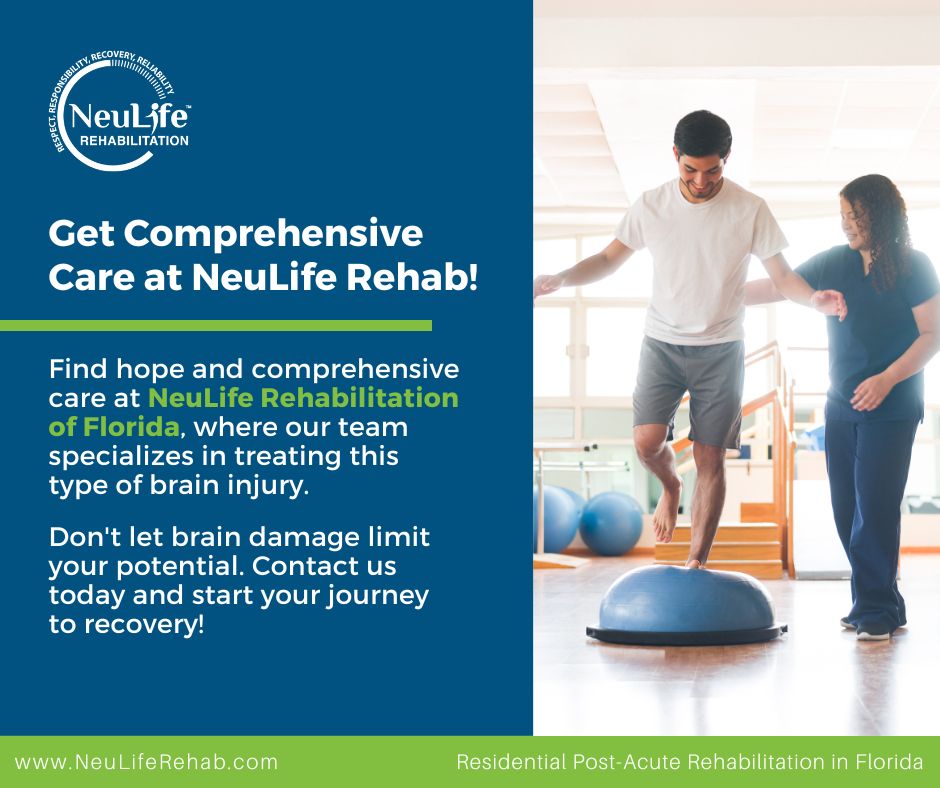The parietal lobe is a critical part of the brain, responsible for sensory perception and integrating sensory information. It is located in the cerebral cortex, the brain's outer layer. The parietal lobe is crucial in various bodily functions, including movement, sensation, and spatial awareness. However, like other brain parts, it is also vulnerable to damage, which can significantly impact an individual's daily life.
This blog post will explore the signs and treatments of parietal lobe injury and how NeuLife can support individuals and their loved ones in neurorehabilitation and recovery.

Parietal lobe damage can occur as a result of several factors, including:
This type of injury occurs when a sudden blow or jolt to the head disrupts the brain's normal functioning. In some cases, TBI may damage the parietal lobe directly, affecting its ability to accurately receive and process sensory information.
A stroke occurs when blood flow to the brain is disrupted. A stroke in the parietal lobe can lead to damage and sensory impairments, such as difficulty with touch, sensation, and spatial awareness.
Brain tumors can also damage the parietal lobe. These abnormal growths can press against the brain tissue, leading to various neurological symptoms, including damage to the parietal lobe.
In rare cases, infections in the brain can also cause damage to the parietal lobe. Examples of such infections include encephalitis, meningitis, and brain abscesses. These infections can damage brain tissue, leading to sensory and motor impairments.
Certain neurological disorders can also cause damage to the parietal lobe. Conditions such as Alzheimer's disease, Parkinson's disease, and multiple sclerosis can affect the brain's structure and lead to damage in the parietal lobe.

The symptoms of parietal lobe damage can vary depending on the severity and location of the injury. Generally, the affected individual may experience physical, cognitive, and behavioral changes. Some common symptoms include:
People with parietal lobe damage may experience changes in their sense of touch, taste, smell, vision, and hearing. It can include numbness, tingling, or even loss of sensation in different body parts. The affected individuals may also have difficulty recognizing objects, faces, or colors.
Parietal lobe damage can cause problems with coordination, movement, and balance. It can also make daily tasks like dressing, eating, and writing difficult. The person may have trouble with hand-eye coordination and fine motor skills.
The parietal lobe is responsible for our sense of space and depth perception. Damage to this area can make judging distances, depth perception, and spatial relationships difficult. The person may also have trouble with navigation and get lost easily.
Injuries to the parietal lobe can also cause speech and language difficulties. The person may have trouble understanding spoken or written language, forming words, or finding the right words to express themselves.
The parietal lobe creates and maintains our body image and awareness. Damage to this area can lead to difficulties with body image, such as trouble recognizing one's body parts.
The parietal lobe is vital in integrating and interpreting visual information. Damage to this area can result in changes in perception, leading to distorted or altered views of the external world. The affected individual may have difficulty recognizing familiar objects or faces, leading to facial recognition and object identification challenges.
Parietal lobe damage can also affect a person's behavior and personality. This can include impulsiveness, mood changes, and difficulty with emotion regulation. The affected individual may also struggle with social interactions, become more withdrawn, or have difficulty with empathy.
The treatment options for parietal lobe damage depend on the severity of the injury and the symptoms experienced by the affected individual. In most cases, a combination of therapies and treatments addresses the physical, cognitive, and behavioral changes caused by the damage.
Here are some common treatments used for parietal lobe damage:
Occupational therapy can help individuals with parietal lobe damage relearn daily activities, such as dressing, grooming, and writing. Occupational therapists will also work on improving hand-eye coordination and fine motor skills.
Physical therapy can help individuals with coordination and movement difficulties caused by parietal lobe damage. It includes exercises to improve muscle strength, balance, and coordination.
Speech therapy can be beneficial for individuals with language and communication difficulties. A speech therapist will work on improving language skills, including understanding and using spoken or written language.
Cognitive therapy aims to improve mental functions like memory, attention, and problem-solving skills. It can help individuals with parietal lobe damage regain cognitive abilities and manage any changes caused by the injury.
Behavioral therapy can help individuals with mood or behavior changes caused by parietal lobe damage. It focuses on managing and regulating emotions and improving social interactions.
Managing parietal lobe damage can be daunting and lengthy, but improving and regaining lost abilities is possible with proper care and support. If you or someone you know is facing this condition, do not hesitate to contact NeuLife Rehabilitation of Florida for expert TBI rehabilitation services.
At NeuLife, a trusted post acute rehabilitation center, we specialize in treating parietal lobe damage and understand the unique challenges it presents. Our team recognizes the significance of individualized treatment plans, including specialized stroke patient rehab. With our all-encompassing rehabilitation services, we address the physical, cognitive, and emotional effects of this condition. Our skilled and empathetic therapists collaborate closely with each person to develop a personalized treatment plan that addresses their specific requirements.
To learn more about our services and how we can support your journey to recovery, don't hesitate to reach out to us. For more information about the effects of TBI on different parts of the brain, check out our blog post "What Parts of the Brain are Affected by TBI?" Additionally, our blog "Frontal Lobes Functions" covers tips for managing and recovering from damage to the frontal lobes.
With NeuLife's expertise, you can trust us to provide the best care for parietal lobe damage. Contact us today.

***
The material on this site is for informational purposes only and DOES NOT CONSTITUTE THE PROVIDING OF MEDICAL ADVICE, and is not intended to be a substitute for independent professional medical judgment, advice, diagnosis, or treatment. Always seek the advice of your physician or other qualified healthcare provider with any questions or concerns you may have regarding your health.
We offer a wide range of therapies and treatments, including physical therapy, occupational therapy, speech therapy, and cognitive therapy. At NeuLife, we also place great emphasis on holistic care, incorporating recreational therapy, nutrition management, and mental health counseling, among others, to promote overall physical, mental, and emotional well-being.
In addition to our highly trained staff and individualized care, we also have state-of-the-art facilities designed to provide a comfortable and supportive environment for our clients. Our goal is to support individuals in their recovery journey and help them regain as much independence as possible.

We know that choosing the next step in your recovery from a catastrophic illness or injury is complex. Together, we can help you take the next step.
Contact us with any questions today.